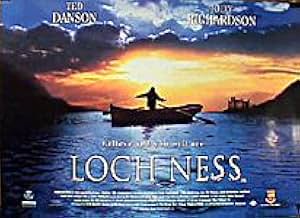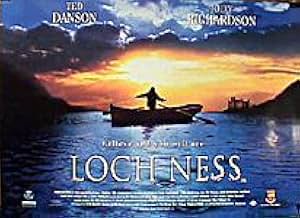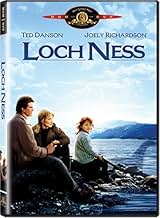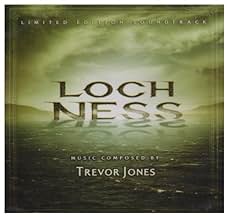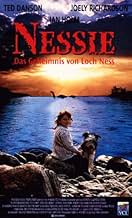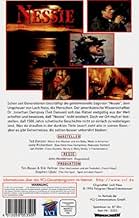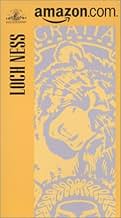Loch Ness
- 1996
- Tous publics
- 1h 41min
Ajouter une intrigue dans votre langueA scientist tries to prove the existence of the Loch Ness monster.A scientist tries to prove the existence of the Loch Ness monster.A scientist tries to prove the existence of the Loch Ness monster.
- Réalisation
- Scénario
- Casting principal
- Récompenses
- 1 victoire et 1 nomination au total
Debora Weston
- Dr. Hunter
- (as Deborah Weston)
Avis à la une
the acting at first i thought seemed a little dry but really builds up character throughout the movie, now Ted Danson adds a great actor to the cast and the little girl really brightens up the movie, all in all not a bad flick for an afternoon movie.
7 out of 10.
7 out of 10.
Okay, it's not exciting but it's still a great film - ideal for 'pleasent' viewing. The cast are brilliant, especially Joley Richardson and Kirsty Graham as mother and daughter - although it is a little unfair to imply that these two alone make the film watchable; others (Ted Danson, Ian Holm, & James Frain) really do help to make this a great film. The story is slow and gentle, making it great for a quiet viewing session. The special effects are limited which allows for the storyline to show through and, even though the end is a little predictable, It's still good to watch right through to Rod Stewart's brilliant closing song. Go for it, I watch it over and over when the mood takes.
I like this movie. It maybe be lukewarm and saccharine as everyone else thinks, but it is far superior to all those Fifties and Sixties lake monster pics. Ted Danson does a wonderful acting job outside of "Cheers" and the special effects are magical. the whole production has a rather Disney feel to it as it makes you believe in magic and takes a different realistic view of one of the world's biggest mysteries. This movie does the same thing "Harry And The Hendersons" did for Bigfoot.
Ted Danson stars as John Dempsey, a college professor who's hit rock bottom. His car breaks down, he's being chased for money and has zero professional credibility left. But his boss offers him a job to redeem himself "Go to Loch Ness, Scotland". Naturally, John thinks he's being asked to find the monster, but his boss says quite the contrary. "Go there and prove it's not there" he offers. Out of options and out of money, Dempsey reluctantly takes the job and heads off to Scotland.
Far from home and hating it, Dempsey reluctantly drags his feet through the nearby town, where his reputation as a monster hunter follows him. Colleagues from the scientific world approach him like adoring fans, asking how he tracked the Yeti and found Bigfoot. It's a past Dempsey would like to forget, as it's the reason no one takes him seriously anymore. And from all his past searchings of urban legends, he's never found anything, so is in complete denial that he will find the Loch Ness. After all, it's isn't real... right?
Armed with a boat he decks out with the best scientific equipment, Dempsey hits the water, with the assistant of his predecessor tagging along. Up and down, back and forth; the professor maps the massive lake with his scanners and sonar gadgets, but nothing is detected. Once again, Dempsey is the centre of jokes and ridicule, as he puts his already tarnished reputation on the line to find something not even the locals believe exists. Until he meets a young girl on the banks of the lake. Her name is Isabel; a wee lass with locks of red hair, and the strongest Scottish accent since Billy Connolly. For the age of nine, she is very cluey and switched on, and might just hold the secret behind the truth of the Loch Ness monster.
"Loch Ness" is not a film about the monster itself, but more about mans search for the monster. And it's an interesting character study, when Dempsey validates his argument that the creature does in fact not exist. He references his past, about being the optimistic monster hunter that believed in the unseen and unexplained. But when he turns up nothing yet again at Loch Ness (to start with at least), he is reminded that like every other story about Bigfoot, aliens and UFO's, they are probably just stories made up to makes us believe there is something better and far greater beyond what we just see with our own eyes. The unexplained mysteries of life allude to that, but when most of us never see such things, it's hard to believe. That is what the message of this film is all about; "Believing is seeing"
Far from home and hating it, Dempsey reluctantly drags his feet through the nearby town, where his reputation as a monster hunter follows him. Colleagues from the scientific world approach him like adoring fans, asking how he tracked the Yeti and found Bigfoot. It's a past Dempsey would like to forget, as it's the reason no one takes him seriously anymore. And from all his past searchings of urban legends, he's never found anything, so is in complete denial that he will find the Loch Ness. After all, it's isn't real... right?
Armed with a boat he decks out with the best scientific equipment, Dempsey hits the water, with the assistant of his predecessor tagging along. Up and down, back and forth; the professor maps the massive lake with his scanners and sonar gadgets, but nothing is detected. Once again, Dempsey is the centre of jokes and ridicule, as he puts his already tarnished reputation on the line to find something not even the locals believe exists. Until he meets a young girl on the banks of the lake. Her name is Isabel; a wee lass with locks of red hair, and the strongest Scottish accent since Billy Connolly. For the age of nine, she is very cluey and switched on, and might just hold the secret behind the truth of the Loch Ness monster.
"Loch Ness" is not a film about the monster itself, but more about mans search for the monster. And it's an interesting character study, when Dempsey validates his argument that the creature does in fact not exist. He references his past, about being the optimistic monster hunter that believed in the unseen and unexplained. But when he turns up nothing yet again at Loch Ness (to start with at least), he is reminded that like every other story about Bigfoot, aliens and UFO's, they are probably just stories made up to makes us believe there is something better and far greater beyond what we just see with our own eyes. The unexplained mysteries of life allude to that, but when most of us never see such things, it's hard to believe. That is what the message of this film is all about; "Believing is seeing"
To those who have not seen this movie: I am going to give you a fair warning. If you are looking for a creature feature, if you are looking for a monster movie, if you are looking for the cheap thrills that are stereotypically imagined coming from a movie with a title such as "Loch Ness", you are not going to get any of these. If who want to see the Loch Ness monster plucking people from docks and boats and gorging on them, don't even bother to start, because "Loch Ness" isn't even remotely along those lines. This is not a low-budget horror movie.
By contrast, this is a pleasantly sweet, low-key, lighthearted movie magic family's entertainment best suited for audience members between the ages of six and thirteen and with some appeal to limited members of the older generation. As an adult, I enjoyed this delightful, if somewhat flimsy, little independent film.
"Loch Ness" is, to a certain extent, not even about the Loch Ness monster. It's really more of a docudrama about the loch itself and the legend of the prehistoric creatures that supposedly dwells beneath its murky surface. The movie stars Ted Danson as a discredited American scientist who has come to Scotland to not find the monster, but, to quote his boss "use the latest technology to prove it's a hoax." Danson himself doesn't believe in the monster even though he's made a name for himself chasing Sasquatch in the Pacific Northwest. While in Scotland, he picks up a research assistant (James Frain) and forms a friendship with the local pub owner (Joely Richardson) and her ubiquitous daughter (Kirsty Graham) who seems to know a little more about the loch than anybody else does.
"Loch Ness" is, all in all, a family movie. There is some peril in the movie, but not enough to terrify the younger audience members. It's got the same spirit as "Free Willy" (1993) if "Free Willy" was set on a lake and the whale merely speculated to be there. Again, if you're a monster movie fanatic, stray away, for the attacks and blood and gore and shiny teeth you seek will not be found. The movie really boasts the question many people have: does the monster even exist? And that is the attitude of the picture. If it were a serious monster movie, we'd know right from the start. But it keeps that question going and going and for that reason, I enjoyed it, for it wasn't just another monster tale, because I personally have seen that movie over and over again, such as in another Loch Ness monster tale called "Beyond Loch Ness" in which the creature was revealed to be real after only five minutes of speculation.
Performances are quite good. Ted Danson is effective as the troubled, doubtful scientist who feels that he's just driving another nail into his credibility's coffin. James Frain is also good, although he does at times overplay his character, but it is refreshing to see the mentor-student relationship between him and Danson whereas it typically would be a tag team. I also liked Joely Richardson and was especially fond of Kirsty Graham as the mysterious little girl with a secret. And the screen is also aided by the presence of veteran actor Ian Holm as a water bailiff who always seems to watching Danson with a suspicious eye.
"Loch Ness" doesn't reach its full potential because of a somewhat flimsy screenplay, with some scenes ending before we hardly even realize they've started. Some of the dialogue is rather poor, some supporting characters just time-wasters, and such, but all in all, it's a simply fine family movie although it will not ring the bells for everybody. I liked it for its sense of wonder and mystery about the loch where this creature may/may not exist (the movie plays that note), I liked it for the performances, I liked it for the beautiful, ear-warming music score by Trevor Jones, the crystal clear cinematography by Clive Tickner, the unique and seldom-explored nature of the ending, and just an overall enthusiastic tone that director John Henderson instilled into this delightful, if flawed family movie.
By contrast, this is a pleasantly sweet, low-key, lighthearted movie magic family's entertainment best suited for audience members between the ages of six and thirteen and with some appeal to limited members of the older generation. As an adult, I enjoyed this delightful, if somewhat flimsy, little independent film.
"Loch Ness" is, to a certain extent, not even about the Loch Ness monster. It's really more of a docudrama about the loch itself and the legend of the prehistoric creatures that supposedly dwells beneath its murky surface. The movie stars Ted Danson as a discredited American scientist who has come to Scotland to not find the monster, but, to quote his boss "use the latest technology to prove it's a hoax." Danson himself doesn't believe in the monster even though he's made a name for himself chasing Sasquatch in the Pacific Northwest. While in Scotland, he picks up a research assistant (James Frain) and forms a friendship with the local pub owner (Joely Richardson) and her ubiquitous daughter (Kirsty Graham) who seems to know a little more about the loch than anybody else does.
"Loch Ness" is, all in all, a family movie. There is some peril in the movie, but not enough to terrify the younger audience members. It's got the same spirit as "Free Willy" (1993) if "Free Willy" was set on a lake and the whale merely speculated to be there. Again, if you're a monster movie fanatic, stray away, for the attacks and blood and gore and shiny teeth you seek will not be found. The movie really boasts the question many people have: does the monster even exist? And that is the attitude of the picture. If it were a serious monster movie, we'd know right from the start. But it keeps that question going and going and for that reason, I enjoyed it, for it wasn't just another monster tale, because I personally have seen that movie over and over again, such as in another Loch Ness monster tale called "Beyond Loch Ness" in which the creature was revealed to be real after only five minutes of speculation.
Performances are quite good. Ted Danson is effective as the troubled, doubtful scientist who feels that he's just driving another nail into his credibility's coffin. James Frain is also good, although he does at times overplay his character, but it is refreshing to see the mentor-student relationship between him and Danson whereas it typically would be a tag team. I also liked Joely Richardson and was especially fond of Kirsty Graham as the mysterious little girl with a secret. And the screen is also aided by the presence of veteran actor Ian Holm as a water bailiff who always seems to watching Danson with a suspicious eye.
"Loch Ness" doesn't reach its full potential because of a somewhat flimsy screenplay, with some scenes ending before we hardly even realize they've started. Some of the dialogue is rather poor, some supporting characters just time-wasters, and such, but all in all, it's a simply fine family movie although it will not ring the bells for everybody. I liked it for its sense of wonder and mystery about the loch where this creature may/may not exist (the movie plays that note), I liked it for the performances, I liked it for the beautiful, ear-warming music score by Trevor Jones, the crystal clear cinematography by Clive Tickner, the unique and seldom-explored nature of the ending, and just an overall enthusiastic tone that director John Henderson instilled into this delightful, if flawed family movie.
Le saviez-vous
- AnecdotesJohn Fusco wrote the screenplay as a tribute to his grandmother Isobel Moffat at the age of twenty-three. The pub and the owner's daughter Isobel are named in tribute.
- GaffesIn the outdoor village scenes seaweed can be clearly seen, this indicates that they were shot next to tidal sea water. Loch Ness is a fresh water loch and hence has no seaweed.
- Citations
Adrian Foot: You couldn't find a dinosaur at the bottom of a whiskey glass.
- ConnexionsFeatured in Troldspejlet: Épisode #17.8 (1997)
Meilleurs choix
Connectez-vous pour évaluer et suivre la liste de favoris afin de recevoir des recommandations personnalisées
- How long is Loch Ness?Alimenté par Alexa
Détails
- Date de sortie
- Pays d’origine
- Langue
- Aussi connu sous le nom de
- Лох-Несс
- Lieux de tournage
- Lower Diabaig, Loch Torridon, Highland, Écosse, Royaume-Uni(bay - hotel - pier)
- Sociétés de production
- Voir plus de crédits d'entreprise sur IMDbPro
Box-office
- Budget
- 7 000 000 $US (estimé)
- Durée
- 1h 41min(101 min)
- Couleur
- Mixage
- Rapport de forme
- 2.35 : 1
Contribuer à cette page
Suggérer une modification ou ajouter du contenu manquant


